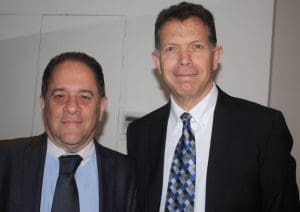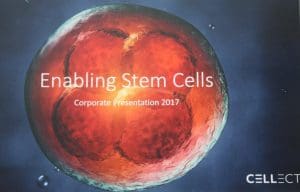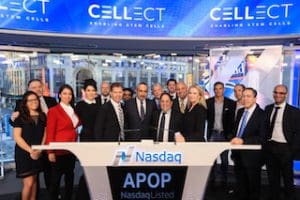
Shai Yarkoni (left) and Eyal Leibovitz of Cellect.
Enabling stem cells: Cellect Bio sets out to offer ‘holy grail’
By James Brewer
It is the holy grail of today’s advanced medicine – replacing a patient’s damaged tissues and parts with stem cell technology rather than attempting to fix the ailment with chemicals, with methods amenable to poisons, by radiation or through massive surgery.
Effecting a “transformation for mankind” medical practices of thousands of years will adjust to a new era. Although stem cells are one of the pillars of 21st century medicine, they have yet to become a quality commodity, easily available for all medicinal purposes.
A life sciences company, Cellect Biotechnology, says that it has developed the enabling platform for mass-production of quality stem cells – building blocks for regenerative medicine – thereby substantially reducing risk and cost of current practice.
The whole industry of stem cells is waiting for this revolution, says Shai Yarkoni, co-founder and chief executive of the company, which is listed on Nasdaq and the Tel Aviv stock exchange.

Cellect’s principal message.
Dr Yarkoni, accompanied by Eyal Leibovitz who is deputy chief executive and chief financial officer, has been in London to heighten investor awareness of the company’s offering. He said that so far, technology has been unable efficiently to isolate stem cells to provide the purity and quantity needed. For mass market treatments, there was an urgent need for the ‘raw material’ represented by stem cells.
The only practice so far in this context has been bone marrow transplant, involving a mix of stem and mature cells, which comes with a huge risk, in many with life-threatening rejection by the immune system, known as Graft-versus-Host-Disease, and possibly death.
This originates from one problem, said Dr Yarkoni: we do not know how to select stem cells. The team of 20 people who work at Cellect have come up with new thinking on how to choose the active stem cells. It has developed a procedure in which protein-coated containers such as infusion bags and test tubes create a hostile environment for rejection-causing cells.
Many companies have tackled this problem, “but they have all hit a brick wall”, said the Cellect chief. “They do not know how to get the raw materials. We are the ones who supply this. We will supply the right cells to do whatever they – companies, physicians – want. This is a breakthrough technology.”
Cellect contends that, as the first to enable the relevant safe and cost-effective procedures, it has a march on comparable companies. Without an efficient selection stage, there will remain a barrier for mass market stem cell therapies and research. As an example of benefits achievable, Cellect claims its method involves two hours of cell selection, as against days or weeks of complex lab work, and halves the total cost of procedure.

Cellect woos European and US investors
There are hopes that the need for parallel, high-intensity chemotherapy with its side-effects harming the immune system, can be alleviated or minimised.
Cells in this procedure are weeded out based on their sensitivity to apoptosis, a word from a language that populates the entire medical lexicon. Apoptosis is derived from the ancient Greek ἀπόπτωσις and here refers to programmed ‘suicide’ of cells that are no longer needed, to cede ground to enriched stem cells.
Cellect achieves this by lacing the containers, which bear the brand name ApoTainer, with an apoptosis-inducing protein. “Within hours from infusing cells into the container, a safe, effective and non-toxic mass of mostly enriched stem cells remain,” says the company. Stem cells flourish in environments where normal cells die. Neutralising harmful cells reduces medical complications, and encourages the natural healing process.
Thus, the production of transplant material devoid of mature immune cell populations has shown promise for reducing the significant risks associated with bone marrow transplant. The latter is currently performed as a last-resort for intractable haematological malignancies, and on a limited basis to correct inborn immune deficiencies.
Bone marrow transplant amounts to a $6.5bn market globally, built on costly licensing. Cellect is hopes to grant multiple non-exclusive licences to “big pharma” companies which are looking for ways to reduce the cost of manufacturing.

Cellect rings the bell on Nasdaq.
Dr Yarkoni, who has had 15 years in the biopharmaceutical Industry, said that Cellect already has an important strategic deal with Entegris, a Nasdaq-listed specialist in advanced plastic devices for high-tech industries. A US foundation has granted a $1.8m budget for a joint development project with Entegris of the ApoTainer.
Founded in 2011, Cellect Bio intends to delist from the Tel Aviv stock exchange to focus on Nasdaq which it says is more appropriate to its financial model.
It says that its technology can be applied to numerous medical procedures, and that its “more effective, safer and less costly transplant procedures” are expected to drive initial commercial demand already in 2017.
In March, the company announced that the first stem cell transplant procedure was successfully performed using its ApoGraft technology in a phase I/II clinical trial in a blood cancer patient.
Dr Yarkoni said at the time: “After 15 years of research, this is the first time we have used our technology on a cancer patient suffering from life-threatening conditions. It is a first good step on a road that we hope will lead to stem cell-based regenerative medicine becoming a safe commodity treatment at every hospital in the world.”
The business has built a strong intellectual property portfolio of seven patent families. Its first planned commercial product is a medical kit designed for the bone marrow transplantations market, and for other markets which require cell selection.
In the second half of 2016, its US initial public offering raised $8.4m before expenses. The company says it is funded with sufficient cash to support phase I and II clinical trials. It may need to raise further funds in six to nine months’ time.
Its path forward is said to compare favourably with many other therapeutics companies, which are looking at a 10-year, $500,000 development outlay.
Of its planned delisting from the Tel Aviv exchange, Cellect reasons that investors globally have demonstrated a stronger appreciation for life sciences companies listed solely on Nasdaq; and that its American exposure will give it greater trading liquidity. It plans to open an office in the Boston area.
Besides their London visit, Dr Yarkoni and Mr Leibovitz have taken their message to Zurich, Geneva, Monaco, Brussels, Luxemburg and US financial centres to ensure that their business is “on the radar.”





